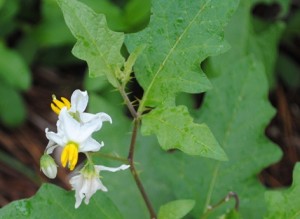The dainty yellow and white flowers belie the disaster potential of the plants. Horsenettles (Solanum carolinense) are blooming and producing fruit in Wakulla County.
Horsenettle can be a serious weed problem in Florida’s perennial grass pastures, hay producing operations and along fence rows. The result of infestation is reduced usable forage production and lower stocking rates.
The Horse-nettle’s fruit is toxic and has caused the death of cattle. Cattle do not usually choose to graze this plant when forage is abundant, but when quality forage is limited due to poor growing conditions or overstocking they may consume these plants.
The plant can be confused with Tropical Soda Apple (TSA) which is in the same plant family. Horsenettle is identified by its immature fruit which are green with white mottling, but much small than TSA’s fruit. The yellow and white flower is quite distinctive (see photo above).
Horsenettle will exploit declining pastures and become established. Bare ground is the perfect environment for establishment of this weed.
Horsenettle seeds can be transported in hay, harvested grass seed, sod, mowing equipment, or dispersed by water, and wildlife. Producers should avoid buying hay contaminated with Horse-nettles as seed are likely to be included.
Scouting and prompt treatment are recommended. This weed can be controlled with herbicide applications of Milestone or Grazon Next. For more information on controlling horsenettle and other pasture weeds, download: Weed Management in Pasture and Rangeland – 2012
- The Federal Reserve’s Beige Book Outlook for the Near Future - August 9, 2019
- Creeping Indigo: Get Ahead of the Problem Now - March 1, 2019
- Horse Hooves Need Extra Care in Wet Pastures - February 15, 2019

